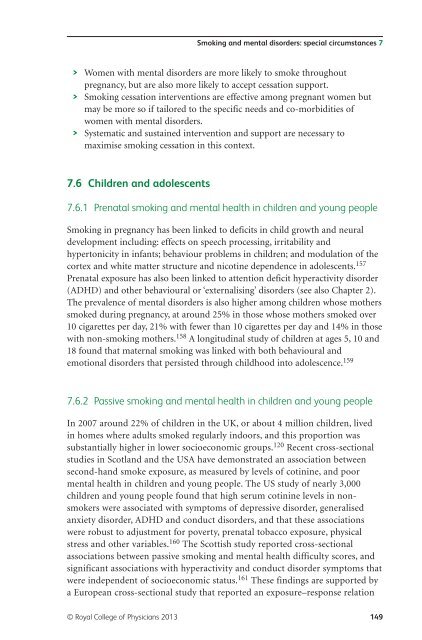Smoking and mental health - NCSCT
Smoking and mental health - NCSCT
Smoking and mental health - NCSCT
Create successful ePaper yourself
Turn your PDF publications into a flip-book with our unique Google optimized e-Paper software.
<strong>Smoking</strong> <strong>and</strong> <strong>mental</strong> disorders: special circumstances 7<br />
> Women with <strong>mental</strong> disorders are more likely to smoke throughout<br />
pregnancy, but are also more likely to accept cessation support.<br />
> <strong>Smoking</strong> cessation interventions are effective among pregnant women but<br />
may be more so if tailored to the specific needs <strong>and</strong> co-morbidities of<br />
women with <strong>mental</strong> disorders.<br />
> Systematic <strong>and</strong> sustained intervention <strong>and</strong> support are necessary to<br />
maximise smoking cessation in this context.<br />
7.6 Children <strong>and</strong> adolescents<br />
7.6.1 Prenatal smoking <strong>and</strong> <strong>mental</strong> <strong>health</strong> in children <strong>and</strong> young people<br />
<strong>Smoking</strong> in pregnancy has been linked to deficits in child growth <strong>and</strong> neural<br />
development including: effects on speech processing, irritability <strong>and</strong><br />
hypertonicity in infants; behaviour problems in children; <strong>and</strong> modulation of the<br />
cortex <strong>and</strong> white matter structure <strong>and</strong> nicotine dependence in adolescents. 157<br />
Prenatal exposure has also been linked to attention deficit hyperactivity disorder<br />
(ADHD) <strong>and</strong> other behavioural or ‘externalising’ disorders (see also Chapter 2).<br />
The prevalence of <strong>mental</strong> disorders is also higher among children whose mothers<br />
smoked during pregnancy, at around 25% in those whose mothers smoked over<br />
10 cigarettes per day, 21% with fewer than 10 cigarettes per day <strong>and</strong> 14% in those<br />
with non-smoking mothers. 158 A longitudinal study of children at ages 5, 10 <strong>and</strong><br />
18 found that maternal smoking was linked with both behavioural <strong>and</strong><br />
emotional disorders that persisted through childhood into adolescence. 159<br />
7.6.2 Passive smoking <strong>and</strong> <strong>mental</strong> <strong>health</strong> in children <strong>and</strong> young people<br />
In 2007 around 22% of children in the UK, or about 4 million children, lived<br />
in homes where adults smoked regularly indoors, <strong>and</strong> this proportion was<br />
substantially higher in lower socioeconomic groups. 120 Recent cross-sectional<br />
studies in Scotl<strong>and</strong> <strong>and</strong> the USA have demonstrated an association between<br />
second-h<strong>and</strong> smoke exposure, as measured by levels of cotinine, <strong>and</strong> poor<br />
<strong>mental</strong> <strong>health</strong> in children <strong>and</strong> young people. The US study of nearly 3,000<br />
children <strong>and</strong> young people found that high serum cotinine levels in nonsmokers<br />
were associated with symptoms of depressive disorder, generalised<br />
anxiety disorder, ADHD <strong>and</strong> conduct disorders, <strong>and</strong> that these associations<br />
were robust to adjustment for poverty, prenatal tobacco exposure, physical<br />
stress <strong>and</strong> other variables. 160 The Scottish study reported cross-sectional<br />
associations between passive smoking <strong>and</strong> <strong>mental</strong> <strong>health</strong> difficulty scores, <strong>and</strong><br />
significant associations with hyperactivity <strong>and</strong> conduct disorder symptoms that<br />
were independent of socioeconomic status. 161 These findings are supported by<br />
a European cross-sectional study that reported an exposure–response relation<br />
© Royal College of Physicians 2013 149














